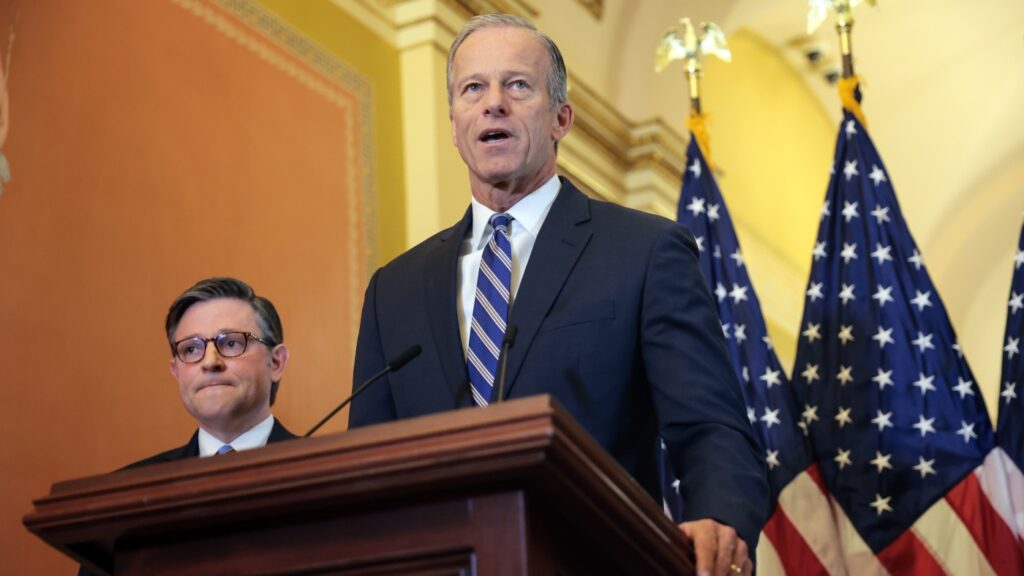
WASHINGTON, DC - APRIL 10: U.S. Senate Majority Leader John Thune (R-SD) (R) and Speaker of the House Mike Johnson (R-LA) hold a press conference on the Republican budget bill at the U.S. Capitol on April 10, 2025 in Washington, DC. The Republican leaders spoke on the reconciliation process and said they would find $1.5 trillion in cuts as the House prepares to vote on President Trump's budget outline for his tax and spending plan after Republican holdouts refused to vote without deeper cuts. (Photo by Kayla Bartkowski/Getty Images)
WASHINGTON, D.C. – Senate Republicans have unveiled an updated version of their sweeping spending and tax cut legislation, aiming for a vote before the July 4 deadline. The bill, which encapsulates much of former President Trump’s domestic agenda, mirrors several policies that narrowly passed the House of Representatives in May. These include the extension of Trump’s 2017 tax cuts, alongside increased allocations for border security, defense, and energy production.
Breaking: Senate Readies for Weekend Vote
Republican leaders are poised to initiate votes on the measure this Saturday. The voting process will feature an open-ended series of amendments, potentially extending into Sunday and leading to further alterations to the bill.
The Senate’s proposed legislation introduces a $5 trillion increase to the debt limit, contrasting with the House’s $4 trillion proposal.
Key Details Emerge
Despite maintaining similar toplines, the Senate bill diverges from the House version with significant changes, notably in Medicaid and the debt limit. Adjustments were made following advice from Senate Parliamentarian Elizabeth MacDonough, who identified provisions that did not qualify for a simple majority under reconciliation rules.
Tax Incentives and Adjustments
The Senate bill incorporates several of the president’s tax-related campaign promises. It allows Americans to deduct up to $25,000 for tip wages and $12,500 for overtime pay through 2028. Additionally, the child tax credit is increased from $2,000 to $2,200 per child, with adjustments for inflation post-2025.
The Senate’s approach to tax deductions includes a $6,000 deduction for individuals over 65 through 2028, compared to the House’s $4,000.
Immediate Impact on Federal Debt and Social Programs
The Senate’s proposal to raise the debt ceiling by $5 trillion is a critical point of contention. Lifting the debt limit doesn’t authorize new spending but allows the government to fulfill existing obligations. Failure to do so could lead to a default, with catastrophic implications for the U.S. and global financial systems.
Moreover, the Senate bill proposes expanded work requirements for the Supplemental Nutrition Assistance Program (SNAP), affecting over 40 million low-income Americans. Changes include heightened state responsibilities for food assistance costs, based on erroneous payment rates.
Industry Response and Internal GOP Strife
Internal divisions within the GOP are pronounced, with fiscal hawks expressing concerns over deficit impacts, while others oppose cuts to social safety nets. Senator Rand Paul of Kentucky has pledged to vote against the bill due to borrowing limit disagreements.
“The Senate bill faces significant pushback from fiscal conservatives and those opposed to altering social programs,” a senior GOP aide noted.
What Comes Next
Should the Senate pass the bill, challenges remain in the House, where a narrow majority must reconcile differences with the Senate’s version. The evolving nature of negotiations means some elements of the bill are still subject to change.
Background Context
This legislative effort follows the House’s passage of a similar bill in May, which included temporary expansions of tax deductions and increased border security funding. The Senate’s modifications reflect ongoing debates over fiscal responsibility and social program funding.
Expert Analysis and Future Implications
Experts warn that the bill’s passage could set significant precedents for future fiscal policy, particularly regarding debt management and social welfare programs. The timing of this legislation is crucial, given the looming expiration of key tax cuts and the approaching debt ceiling deadline.
As the Senate moves forward, the potential economic impacts and political ramifications will be closely monitored by both domestic and international stakeholders.




